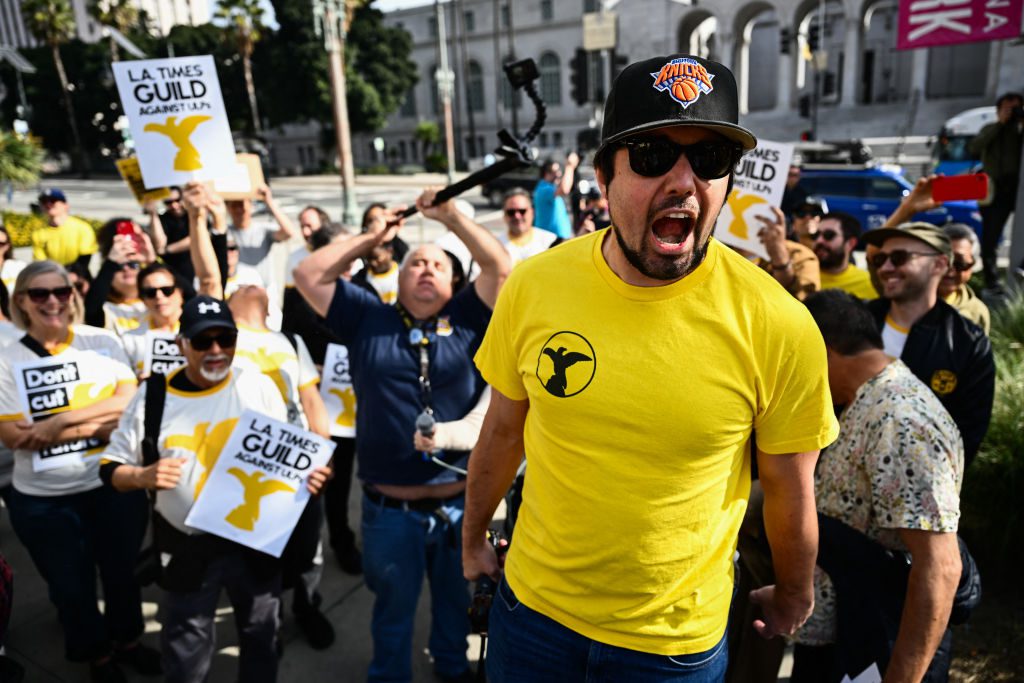Source: PATRICK T. FALLON / Getty
Several legacy media companies have faced huge layoffs and completely obliterated their newsrooms. Notably, LA Times, The Washington Post and Forbes have suffered from massive layoffs, which threatens news coverage in this election year. Read more about the unfortunate times for journalists and what this could mean for news in an election year.
Times are wild for journalists and subsequently, Americans will be affected as well. As America prepares to elect its next presidential candidate and other officials across the political sphere, fair and honest news coverage is threatened.
Recently, the LA Times fired 115 journalists in an HR Zoom webinar, following a series of union protests. According to a conversation on NPR, employees shared their experience in the streets and online.
“It has laid off about 115 journalists in its newsroom of what had been about 500,” David Folkenflik shares on NPR. “And that will represent about 22, 23% layoff happening in a single day. “
Several newsrooms have been completely wipes as papers struggle under billionaire owners. The Washington Post also laid off 10 percent of its ownership. Similar to the LA Times, it is owned by a civic-minded billionaire.
“In its case, in Washington, that’s Amazon founder Jeff Bezos,” Folkenflik continued. “And it tells you that simply having passels of money doesn’t mean that that’s financially viable for the organizations themselves even if one can take issue with the way in which these cuts were handled. I also got to say, though, we at NPR went through a 10% cut last year.”
These are only two examples of the hardships journalists have faced in recent months. Other papers and magazines like Vox, Forbes, Time Magazine, Conde Nast have also suffered from major layoffs.
Conde Nast employees infamously held protests last week, boycotting the injustices and low wages they have endured over the years.
According to AP News, unionized journalists at Forbes, who also organized in 2021, said they’re protesting stalled contract negotiations that have lasted more than two years, among other workplace issues.
Journalists at The New York Daily News and Forbes walked off the job Thursday (Jan. 25) amid contentious contract talks with management and a challenging couple of weeks in the news industry. Both strikes have proved to be historic as it’s the first-ever at the business centric magazine in over a century and the first at the storied newspaper in over three decades.
Folkenflik answered why he feels this is happening on NPR.
“Well, I think there’s a confluence of factors here, right? think that, for a great deal of time, owners sort of were on this quest to extract as much money as possible,” he shared on the show. “And at the same moment, what they really needed to be doing was figuring out how to establish a bond with their audiences to be paying subscribers. The transformation really undermined legacy media, particularly print publishers like magazines and newspapers. People can get what they want elsewhere or get good enough elsewhere. And then there’s this promise of podcasts – right? – this – not only for those of us in audio here at NPR but at other places like the Post, like the LA Times. And the advertising industry for that collapsed as their fears of recession overwhelmed people who’d put money into advertisements. And that recession never came, but it led to a media recession, where so many dollars went away that suddenly, you had layoffs all over.”
It’s most concerning for the Black and Brown journalists in these newsrooms, raising fear that Americans will look more to social media and citizen news for public information. It also raises concerns that there will be no source to call out misinformation and fake content aimed at Black and Brown communities in an election year.
We urge you to cite your sources and find out the proper information by researching your concerns with legitimate publications and news sites.







